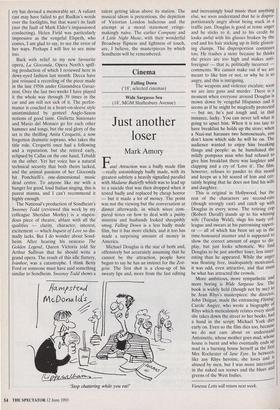Cinema
Falling Down (`18', selected cinemas) Wide Sargasso Sea (18', MGM Shaftesbury Avenue)
Just another loser
Mark Amory
— really astonishingly badly made, with its greatest subtlety a heavily signalled parallel with Madame Butterfly which was to lead up to a suicide that was then dropped when it tested badly and replaced by cheap horror — but it made a lot of money. The point was not the viewing but the conversation at dinner afterwards, in which wives com- pared notes on how to deal with a pushy mistress and husbands looked sheepishly smug. Falling Down is a less badly made film, but it has more clichés, and it too has made a surprising amount of money in America.
Michael Douglas is the star of both and, offensively but accurately assuming that he cannot be the attraction, people have begun to say he has an instinct for the Zeit- geist. The first shot is a close-up of his sweaty lips and, more from the fast editing `Stop chattering while you eat!' and increasingly loud music than anything else, we soon understand that he is dispro- portionately angry about being stuck in a traffic jam. Douglas is good at tense anger and he sticks to it, and to his credit he looks awful with his glasses broken by the end and his hair sticking up in little glisten- ing clumps. The disproportion continues too. He trashes a store because he thinks the prices are too high and makes anti- foreigner — that is, politically incorrect comments. We cannot make out if we are meant to like him or not, or why he is so angry, and this is intriguing.
The weapons and violence escalate; soon we are into guns and murder. There is a moment when everyone around Douglas is mown down by vengeful Hispanics and it seems as if he might be magically protected — but no, he's just tough and, in that instance, lucky. You can never tell what is going to upset him. When it is too late to have breakfast he holds up the store; when a Nazi-nut harasses two homosexuals, you don't know which side he will be on. The audience wanted to enjoy him breaking things and people: as he humiliated the mildly pompous man who had refused to give him breakfast there was laughter and clapping and a cry of 'Love it'. The film, however, refuses to pander to this mood and keeps us a bit scared of him and cer- tainly hoping that he does not find his wife and daughter.
This is original in Hollywood, but the rest of the characters are second-rate (though strongly cast) and catch up with Douglas in every sense. The retiring cop (Robert Duvall) stands up to his whining wife (Tuesday Weld), slugs his nasty col- league and swears at his patronising superi- or — all of which has been set up in the time-honoured manner and is supposed to show the correct amount of anger to dis- play, but just looks schematic. We find Douglas to be just another loser, less inter- esting than he appeared. While the anger was floating free, inadequately motivated, it was odd, even attractive, and that must be what has attracted the crowds.
More ambitious, more sympathetic and more boring is Wide Sargasso Sea. The book is widely held (though not by me) to be Jean Rhys's masterpiece: the director, John Duigan, made the entrancing Flirting; Carole Angier, who wrote a biography of Rhys which meticulously relates every stroll she takes down the street to her books, had a hand in the script; Michael York dies early on. Even so the film dies too, because we do not care about or understand Antoinette, whose mother goes mad, whose house is burnt and who eventually ends UP mad in a burning house herself as the first Mrs Rochester of Jane Eyre. In between,
I like any Rhys heroine, she loves and s abused by men, but I was more interested in the naked sex scenes and the blues and greens of the West Indies.
Vanessa Letts will return next week.


































































 Previous page
Previous page